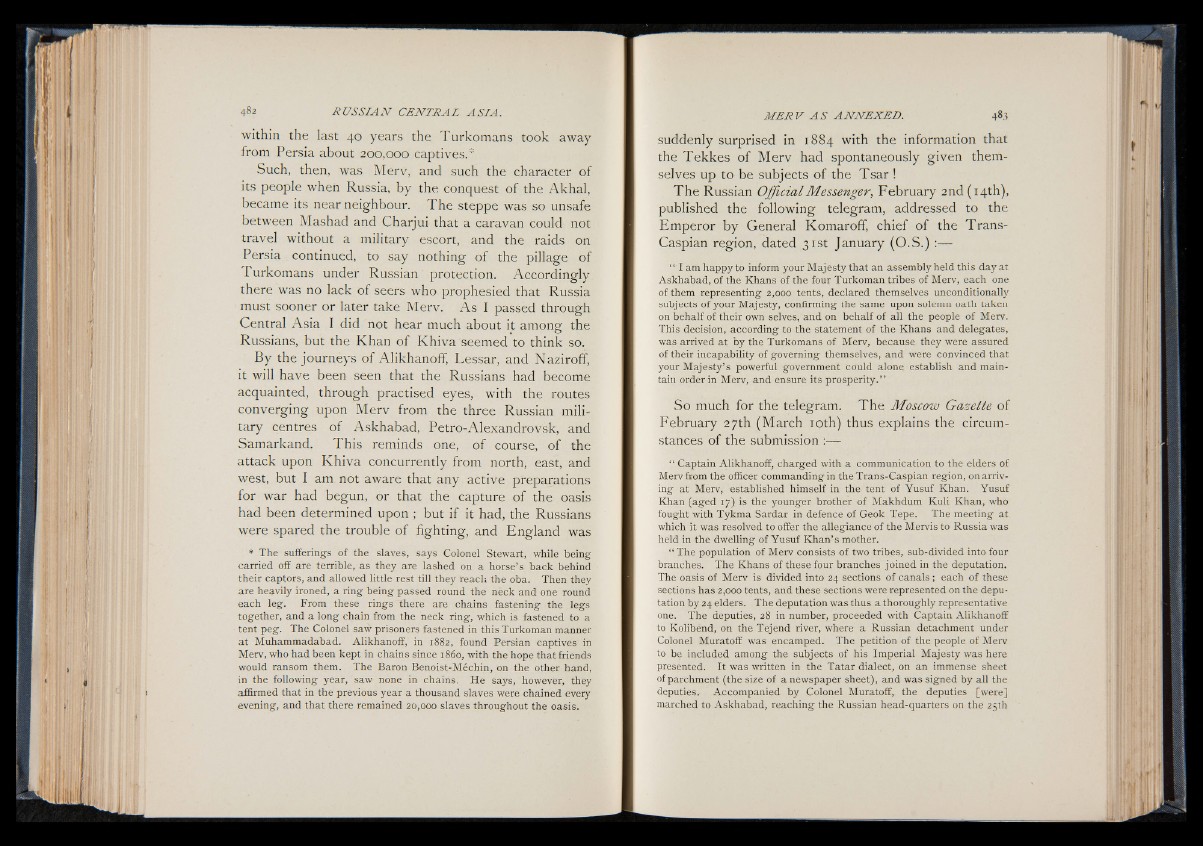
within the last 40 years the Turkomans took away
from Persia about 200,000 captives.*
Such, then, was Merv, and such the character of
its people when Russia, by the conquest of the Akhal,
became its near neighbour. The steppe was so unsafe
between Mashad and Charjui that a caravan could not
travel without a military escort, and the raids on
Persia continued, to say nothing of the pillage of
Turkomans under Russian protection. Accordingly
there was no lack of seers who prophesied that Russia
must sooner or later take Merv. A s I passed through
Central Asia I did not hear much about it among the
Russians, but the Khan of Khiva seemed to think so.
By the journeys of Alikhanoff, Lessar, and Naziroff,
it will have been seen that the Russians had become
acquainted, through practised eyes, with the routes
converging upon Merv from the three Russian military
centres of Askhabad, Petro-Alexandrovsk, and
Samarkand. This reminds one, of course, of the
attack upon Khiva concurrently from north, east, and
west, but I am not aware that any active preparations
for war had begun, or that the capture of the oasis
had been determined upon ; but if it had, the Russians
were spared the trouble of fighting, and England was
* The sufferings of the slaves, says Colonel Stewart, while being
carried off are terrible, as they are lashed on a horse’ s back behind
their captors, and allowed little rest till they reach the oba. Then they
are heavily ironed, a ring being passed round the neck and one round
each leg. From these rings there are chains fastening the legs
together, and a long chain from the neck ring, which is fastened to a
tent peg. The Colonel saw prisoners fastened in this Turkoman manner
at Muhammadabad. Alikhanoff, in 1882, found Persian captives in
Merv, who had been kept in chains since i860, with the hope that friends
would ransom them. The Baron Benoist-Mechin, on the other hand,
in the following year, saw none in chains. He says, however, they
affirmed that in the previous year a thousand slaves were chained every
evening, and that there remained 20,000 slaves throughout the oasis.
suddenly surprised in 1884 with the information that
the Tekkes of Merv had spontaneously given themselves
up to be subjects of the Tsar |
The Russian Official Messenger, February 2nd (14th),
published the following telegram, addressed to the
Emperor by General Komaroff, chief of the Trans-
Caspian region, dated 31st January (O.S.) -
“ I am happy to inform your Majesty that an assembly held this day at
Askhabad, of the Khans of the four Turkoman tribes of Merv, each one
of them representing 2,000 tents, declared themselves unconditionally
subjects of your Majesty, confirming the same upon solemn oath taken
on behalf of their own selves, and on behalf of all the people of Merv.
This decision, according to the statement of the Khans and delegates,
was arrived at by the Turkomans of Merv, because they were assured
of their incapability of governing themselves, and were convinced that
your Majesty’ s powerful government could alone establish and maintain
order in Merv, and ensure its prosperity.”
So much for the telegram. The Moscow Gazette of
February 27th (March ioth) thus explains the circumstances
of the submission :—
“ Captain Alikhanoff, charged with a communication to the elders of
Merv from the officer commanding in the Trans-Caspian region, on arriving
at Merv, established himself in the tent of Yusuf Khan. Yusuf
Khan (aged 17) is the younger brother of Makhdum Kuli Khan, who
fought with Tykma Sardar in defence of Geok Tepe. The meeting at
which it was resolved to offer the allegiance of the Mervis to Russia was
held in the dwelling of Yusuf Khan’s mother.
“ The population of Merv consists of two tribes, sub-divided into four
branches. The Khans of these four branches joined in the deputation.
The oasis of Merv is divided into 24 sections of canals ; each of these
sections has 2,000 tents, and these sections were represented on the deputation
by 24 elders. The deputation was thus a thoroughly representative
one. The deputies, 28 in number, proceeded with Captain Alikhanoff
to Kolibend, on the Tejend river, where a Russian detachment under
Colonel Muratoff was encamped. The petition of the people of Merv
to be included among the subjects of his Imperial Majesty was here
presented. It was written in the Tatar dialect, on an immense sheet
of parchment (the size of a newspaper sheet), and was signed by all the
deputies.- Accompanied by Colonel Muratoff, the deputies [were]
marched to Askhabad, reaching the Russian head-quarters on the 25th